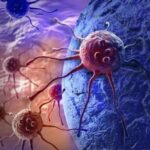According to Aboluowang, a 48-year-old Chinese male patient was diagnosed with late-stage lung cancer.
The doctor pointed out that the patient’s first mistake was ignoring abnormal signs from his body for over three months without seeking medical attention.
The patient simply attributed his symptoms to the after-effects of a cold.
“The patient had a cold over three months ago and then developed a persistent dry cough, but he thought it was just a consequence of the cold,” the doctor explained.
The second mistake was that the patient had been a long-term smoker but never underwent health check-ups. According to the patient, he started smoking at the age of 18 and had maintained this habit for 30 years.
Smoking and lung damage are key factors leading to lung cancer.
From this case, the treating doctor advised that lung cancer often presents early warning signs. Therefore, people should pay attention to the following symptoms:
Recurrent headaches
Tumors can develop in the brain, and they can be primary tumors, such as gliomas, meningiomas, primary malignant intracranial tumors, or metastases from other cancers such as lung, colorectal, stomach, or breast cancer…
Whether it’s a primary or metastatic malignant tumor, if it’s located in the head region, it can cause headaches. So, if you experience persistent or worsening headaches, early medical examination is crucial.

Persistent dry cough
The first symptom of lung cancer is often not chest pain, coughing up blood, or difficulty breathing, but a persistent dry cough. This symptom is easily overlooked and often mistaken for a cold after-effect, an allergy, or bronchitis.
Prolonged abdominal pain
The abdominal region houses vital organs such as the liver, stomach, gallbladder, pancreas, small intestine, and large intestine… Cancer in any of these organs can cause abdominal pain. The pain will intensify as the tumor grows, and pain relief medication may be necessary to manage the discomfort.
Unexplained weight loss
If you unintentionally lose weight without trying to, it could be a sign of concern as cancer is a common cause of unexplained weight loss. As cancer progresses, the body consumes more nutrients, leading to weight loss and fatigue. This is also why late-stage cancer patients often become debilitated.
Fatigue
Fatigue is a common symptom in cancer patients, and its causes are multifaceted. Some cancers can cause anemia due to blood loss or malnutrition, resulting in fatigue. Other cancers may decrease appetite and cause weight loss, leading to exhaustion. Additionally, cancer can disrupt sleep patterns, contributing to prolonged fatigue.

Frequent minor illnesses
Cancer can abnormally weaken the body’s immune system. When immunity is compromised, the body loses its ability to defend itself, allowing bacteria and viruses from the external environment to easily enter through the respiratory, digestive, and urinary tracts, leading to recurrent infections.
Loss of appetite
As cancer progresses, it releases a large amount of toxins that suppress appetite, causing you to gradually lose interest in food, even your favorite dishes.
Over time, cancer can easily metastasize to other organs. For example, lung, breast, stomach, or colorectal cancer can spread to the liver, the largest digestive organ. When cancer metastasizes to the liver, it can also cause abnormal loss of appetite.





































